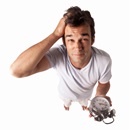 Getting enough rest each day is one of the most important ways of leading a healthy lifestyle. It can significantly improve one’s performance at work or at school, as well as maintain the normal physiologic activities of the body. Sufficient sleep may also prevent the occurrence of accidents while driving or operating a motor vehicle. The performance of an individual is thus influenced by the amount of rest that his or her body receives. On the other hand, individuals with sleep problems such as insomnia tend to struggle with keeping awake during the day and may most probably be experiencing difficulty in maintaining their performance at work or at school.
Getting enough rest each day is one of the most important ways of leading a healthy lifestyle. It can significantly improve one’s performance at work or at school, as well as maintain the normal physiologic activities of the body. Sufficient sleep may also prevent the occurrence of accidents while driving or operating a motor vehicle. The performance of an individual is thus influenced by the amount of rest that his or her body receives. On the other hand, individuals with sleep problems such as insomnia tend to struggle with keeping awake during the day and may most probably be experiencing difficulty in maintaining their performance at work or at school.
How Insomnia Affects Performance
Most sleep problems are associated with stress-related issues at work, family, and school, to say the least. However, it is also important to understand that insomnia may also be caused by external factors that surround an individual. According to a recent report published in the journal Environmental Health Perspectives, traffic noise may also disrupt sleep for some individuals and this may result in the deterioration of both physical and mental health. Insomnia due to outside noise from traffic may thus influence the performance of an individual.
Advertisement
The researchers conducted this study because they wanted to determine the actual impact of stress noise on the quality of sleep of individuals. Initial research efforts by other groups have focused on this association between sleep problems and traffic noise using an experimental setting, in which study participants are asked to sleep in the laboratory amid various types of noise that simulates traffic sounds. In this research study, the investigators requested the participation of the public in establishing the relationship between insomnia due to traffic noise and their general health and performance.
The research study involves approximately 7,019 subjects residing in two cities in Finland, namely Helsinki and Vantaa.
These study participants were all adults who were employed in the public sector. Approximately 81% of the study population was composed of women, whereas 19% consisted of men. The study participants received survey forms through the mail and the included questions regarding issues with sleep problems and their general health and performance. The noise level during the evening was determined based on the degree of traffic that was measured in each of the two cities. The information submitted by the study participants regarding the occurrence of insomnia and general health and performance were then examined in terms of association with the actual level of traffic noise during the night.
RELATED READING: Elderly ‘Super Brains’ Identified
The results of the study showed that symptoms of insomnia, such as difficulty in falling asleep, or the feeling of insufficient sleep upon waking up in the morning, were reported by study participants who were exposed to at least 55 decibels of traffic noise in the evenings. Interestingly, the symptoms of insomnia were observed to occur at least twice each week. The study participants also reported that they frequently wake up at night due to the traffic noise and their lack of restorative rest has resulted in the development of anxiety. It is thus apparent that both the mental and physical health of the study participants have been affected by the symptoms of insomnia that were associated with traffic noise in the evening. In addition, their general performance may have also suffered from the lack of restorative sleep at night.
The information presented in this recent medical report may be useful in better understanding the influence of external factors such as traffic noise on the quality of rest attained each night. The findings of the study suggest that the health and performance of a person may be affected by traffic-related noise, mainly by making it more difficult to continuously sleep through the night.
Related Reading: Your tiredness could be hypersomnia
